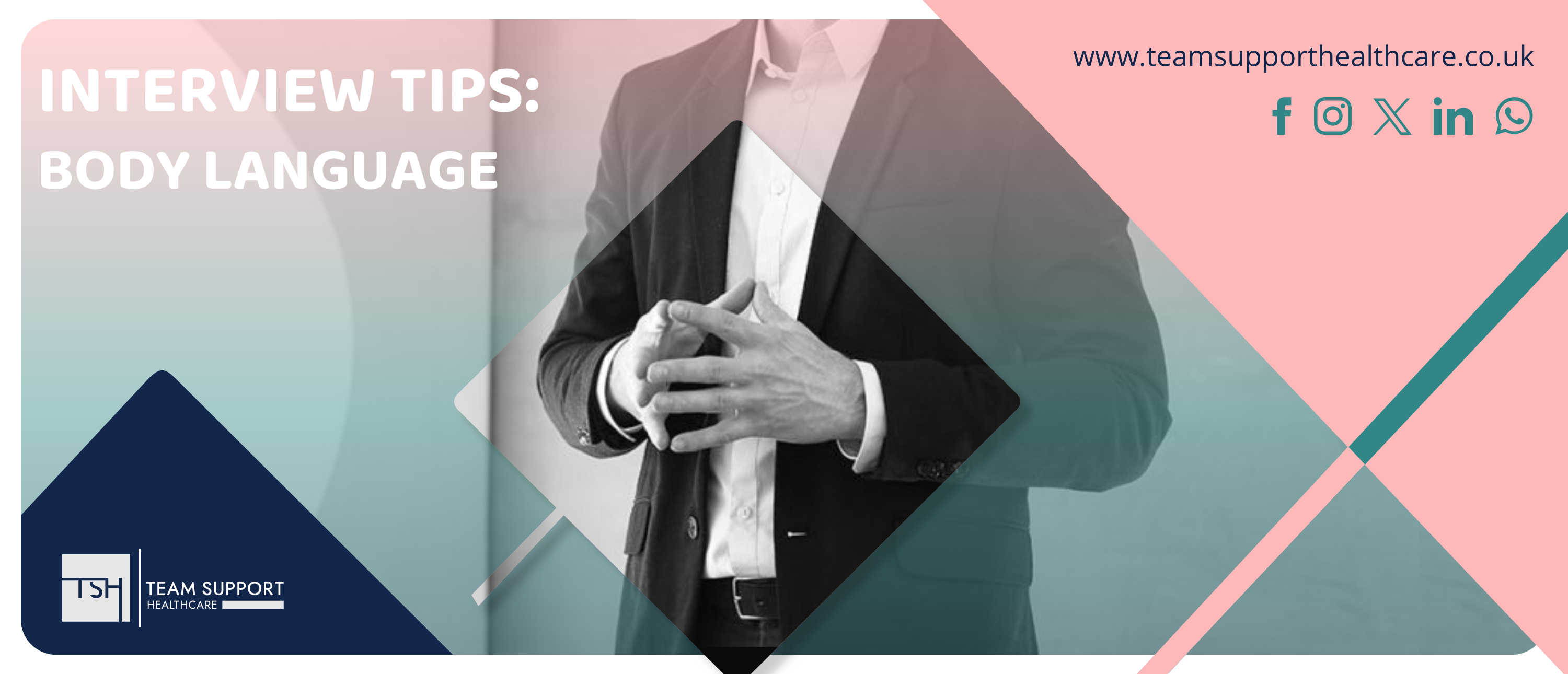Interview Tips: Body Language
If you’re preparing for an interview, we have some tips that may help you to secure the job. Did you know, only a small percentage of communication is down to the words we say? In fact, it’s believed to be as little as 7%. The remaining 93% of communication is conveyed through other means.
Words, Tone, Body Language
“It was Albert Mehrabian, a researcher of body language, who first broke down the components of a face-to-face conversation. He found that communication is 55% nonverbal (body language), 38% vocal (tone/voice), and 7% words only.” – University of Texas.

Kinesics
Kinesics, which is the study of body language, “comes from the Greek word “kinesis,” meaning motion or movement.” – Zella Life.
However, it’s important to note that “Kinesics communication can vary greatly across different cultures. What might be a friendly gesture in one culture could be seen as rude or inappropriate in another.”
Humans clearly rely heavily on body language in order to express themselves. In fact, “Body language is something that is usually natural and is often done instinctively rather than consciously” says MCIS Languages.
So, what can you do to signal exactly what you want to via your body language? Here are some things to consider during a face-to-face interview.
Things to do:
- Position your body/legs towards the interviewer
When crossing your legs at the knee, it’s important to be aware that: Crossing your leg towards the person is considered an act of engaging and listening, whereas, crossing the leg in the other direction gives the impression that you are disinterested. Psychologists say that, in general, we tend to cross our legs towards those we trust and like and away from those we do not.
An open torso
Having an open and wide torso (as opposed to a covered and hidden one) displays confidence. Think about Superman’s; hand on hip pose. It radiates dominance and power. It’s said that this posture naturally increases testosterone levels and inhibits cortisol production (the hormone released when you are stressed or endangered). “Practicing “power poses” before an important meeting for 2–3 minutes will help you feel more powerful” claims Fact Retriever.
Bonus fact: “Humans like many other animals (e.g., lizards, birds, dogs, and primates) puff up their chests when they are trying to establish territorial dominance. Human males may also bare their torso. Scientists are unsure whether this is to show off muscles, protect discarded clothing, or rob an opponent of a type of hold.” – Fact Retriever.
Touching the cheek or looking skyward
During an interview, it is ok to intermittently look away to the ceiling or to touch the cheek, as it shows you are really thinking about the question. Experts say that when we are trying to concentrate or remember something, we automatically tend to look upwards. This action can help you to gather your thoughts and give a considered answer to a question.
Something to consider: “Rodin’s “The Thinker” shows a thoughtful evaluative attitude, but the body posture and hand supporting the head also reveal a dejected person”- Fact Retriever.
Hand steepling
If you are interviewing for a job where management skills and assertiveness are key, consider holding your fingertips together in a “V” shape with your palms apart. This action radiates a sense of authority and control.
On the flip side: “In contrast to hand-steepling, hand wringing is a universal way of showing distress or concern.”
Mirroring
Mirroring is, effectively, mimicking the body language of the other person. Mirroring is used in lots of social interactions, often unconsciously, but it can play an important role in an interview. Think about it, the way the interviewer is sitting is how that person believes is the desired way to sit. Going off their lead shows you feel the same way, you are on the same level and feel at ease in their presence. Studies show that if we mirror a gesture, we are unconsciously trying to bond the relationship with that person.
Things to avoid:
Crossing your arms
Psychologically speaking, there are benefits to this pose. The action itself forces both sides of the brain to engage, which makes it easier for the individual to focus and solve difficult problems.
However, subconsciously, when someone crosses their arms across their chest, they are effectively telling the person opposite them that they are on the defence. Crossing our arms is sometimes our way of protecting ourselves in certain situations. It can be viewed as a barrier and can make the person appear resistant and lacking in openness (Wilding, 2018).
Holding a drink in front of your face
If you have been offered a beverage during your interview, it’s important that you do not obstruct your face regularly with the cup or glass whilst talking. Apparently, the higher you hold your coffee, the more of a physical barrier you put up between yourself and the person you’re talking to.
Playing with your hair
This may be an obvious one, but it is a common mistake people tend to make out of nervousness. Playing with one’s hair is one of several pacifying behaviours. Others include: massaging/stroking our necks or rubbing their cheeks or lips from inside with their tongues.
According to Traveller Gazette “All these pacifying behaviours release calming endorphins to soothe the brain” which is why they may make an appearance during, say, an interview.
Try to avoid these behaviours so as not to give off the impression that you are nervous, unsure, fidgety and lacking in confidence.
Touching or tugging at your ear
Behaviourists believe that the action of touching or pulling at the ear can indicate indecisiveness. If you want to come across as an assertive and commanding candidate, try not to do this action.
Slouching/shrinking down in your chair
Again, this seems obvious, but some people may not realise how slack their sitting posture is. It’s worth making a conscious effort to keep a straight back and square shoulders to reaffirm that you are attentive and stimulated by the conversation. A slouching pose gives the impression that you are either afraid or unmotivated (Wilding, 2018).
Avoiding making eye contact
This is one that a lot of people struggle with. Prolonged eye contact can be uncomfortable for some, as it can be quite an intimate or intimidating experience. Where possible, try to make eye contact (even if it’s fleeting) to help reinforce that you are focussed, rather than avoidant or distracted. If eye contact is something you struggle with generally, it may even be worth explaining this beforehand so that the avoidance is not misconstrued (Wilding, 2018).
Weak handshakes
According to experts in the study of human behaviour, a weak or slack handshake can sometimes indicate unreliability or disrespect. When going in to shake someone’s hand, try to keep your arm and hand firm (without gripping their hand like a vice)(Wilding, 2018).
Bonus facts: Some scientists believe that humans shake hands in order to exchange body odours. Additionally, a limp or exposed wrist is often viewed as a sign of submission. – Fact Retriever.
Tilting your body or head away from the person
This is most likely an unconscious habit, so it’s important to make a concerted effort to avoid it. Leaning the head or body in the opposite direction of the person can be perceived as a lack of interest or even dislike (Wilding, 2018).
How To Improve/Control Our Body Language
If you’re unsure whether you are exhibiting any of these behaviours during stressful situations, Zella Life has some useful tips to consider when analysing our body language.
Practice mindfulness: Being present and aware of your own thoughts and actions can help you become more attuned to your body language.
Seek feedback: Ask trusted friends or colleagues for honest feedback on the verbal message that your nonverbal communication sends. This can help you identify patterns or habits that you may not be aware of.
Record yourself: Video yourself in various situations and pay attention to your body language. This can help you see how you present yourself to others and identify areas for improvement.
Sources:
https://www.factretriever.com/body-language-facts
https://psych2go.net/20-body-language-facts/
https://travellergazette.com/body-language-signs-is/6/
https://www.mindtools.com/ao9kek8/mehrabians-communication-model
We Want To Help
Team Support Healthcare are experts at recruiting within the medical field. If you want to chat to us about your job prospects, get in touch via the form below.
